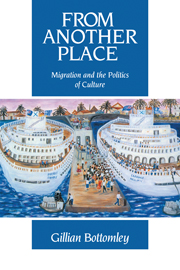Book contents
- Frontmatter
- Contents
- Preface and acknowledgements
- Part I Migration studies and the problem of culture
- Part II Practising cultures
- Chapter 4 The politics and poetics of ethnicity
- Chapter 5 Dance, music and relations of power
- Chapter 6 Re-negotiating ‘tradition’: the case of dowry
- Part III Constructing identities: gender, class, and ethnos
- Bibliography
- Index
Chapter 4 - The politics and poetics of ethnicity
Published online by Cambridge University Press: 05 November 2011
- Frontmatter
- Contents
- Preface and acknowledgements
- Part I Migration studies and the problem of culture
- Part II Practising cultures
- Chapter 4 The politics and poetics of ethnicity
- Chapter 5 Dance, music and relations of power
- Chapter 6 Re-negotiating ‘tradition’: the case of dowry
- Part III Constructing identities: gender, class, and ethnos
- Bibliography
- Index
Summary
Stranded between the country you have just left and an unknown place where you have not yet truly arrived, you find yourself groping in a fleeting reality. But as perception becomes more attuned with topological uncertainty, it also becomes less acceptant, more inventive and ultimately, I believe, more autonomous.
Delaruelle, 1990, p.67POLITICS
The studies discussed in chapter 3 demonstrate that ethnicity, ‘a consciousness of kind’, is constructed and reconstituted in relation to specific political and economic circumstances. In this process, particular beliefs and practices are emphasised as boundary markers. Thus, the Guyanese Indians emphasised religion and family values to distinguish themselves from their Afro-Caribbean fellow workers, and most Greek-Australians regard their own loyalty to family as clearly superior to the attitudes of the less familial Anglo-Celts. In other words, ethnicity is used in these contexts as a resource in the struggle for symbolic capital – in particular, to counteract the negative representations of immigrant workers, ‘coolies’ and those with minimal power in their ‘host’ societies. At the same time, ethnicity is an important element of psychosocial identity, and the energy expended on the reconstruction and maintenance of beliefs and practices also demonstrates their positive significance, especially in emigrant populations.
In chapters 2 and 3, however, I mentioned several critiques of the concept of ethnicity. Writers have tended to argue for either class or ethnicity as explanatory variables, and policy makers have often explicitly opted for one or the other as a basis for political organisation.
- Type
- Chapter
- Information
- From Another PlaceMigration and the Politics of Culture, pp. 57 - 70Publisher: Cambridge University PressPrint publication year: 1992



